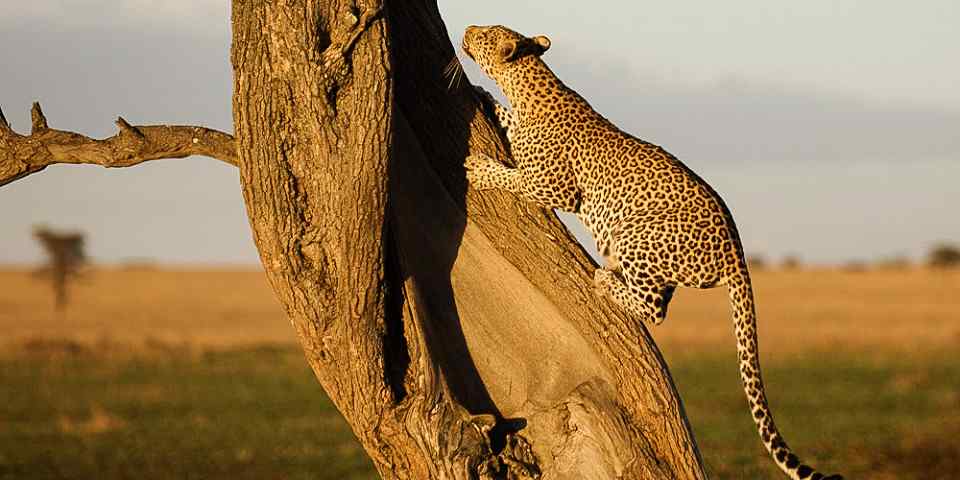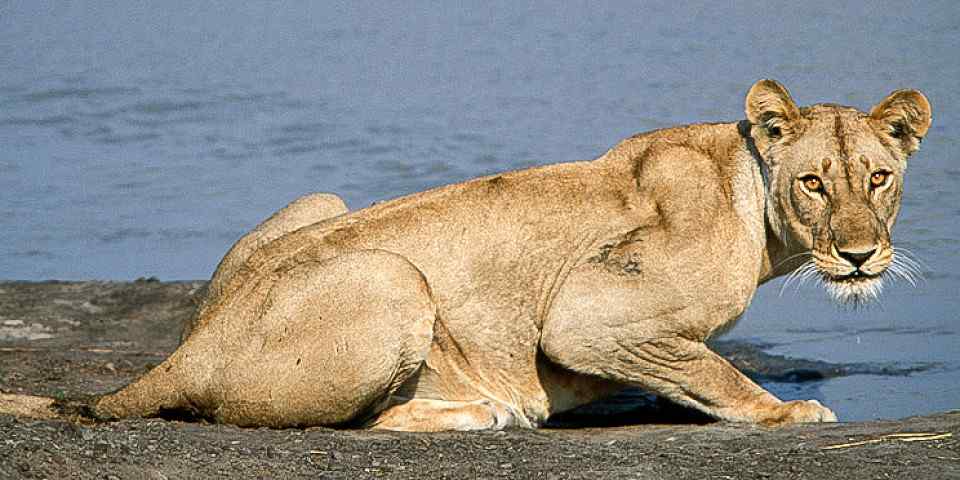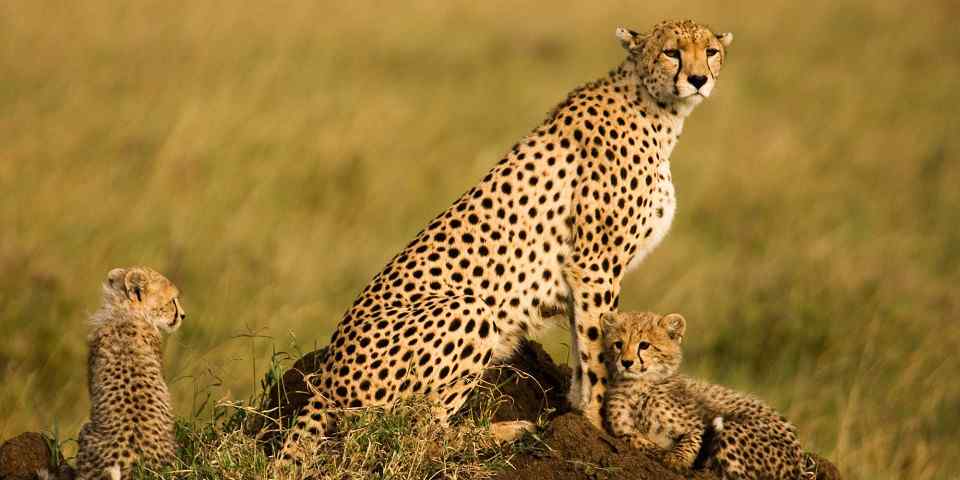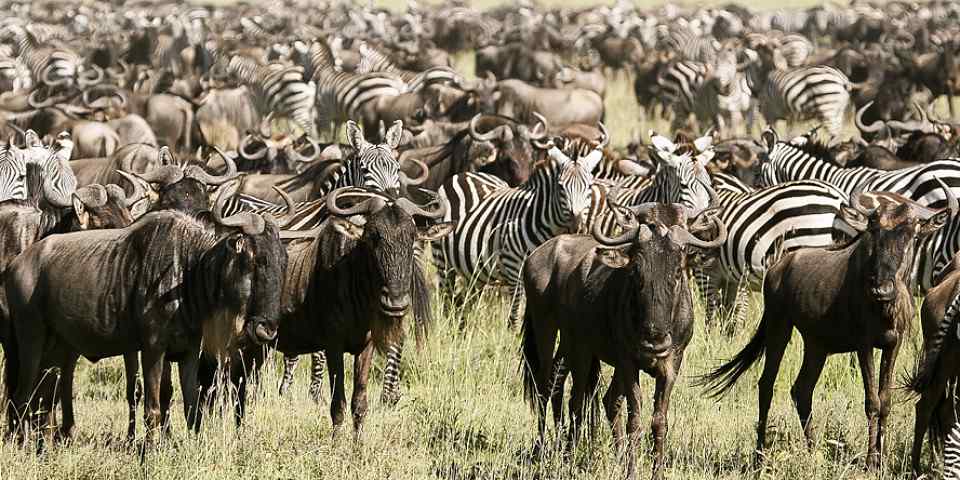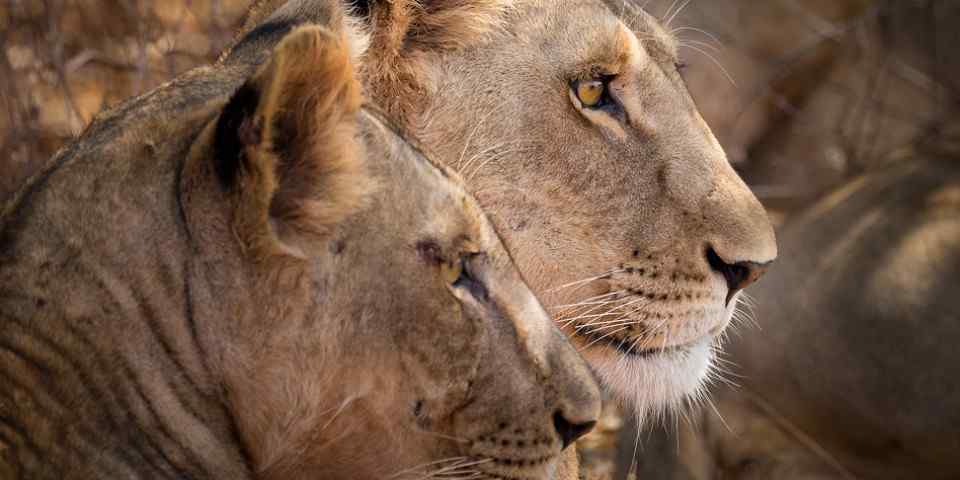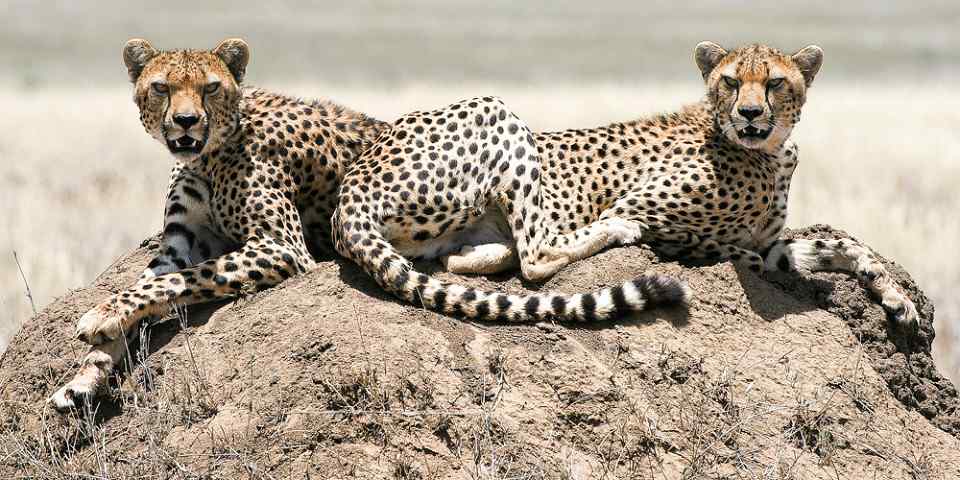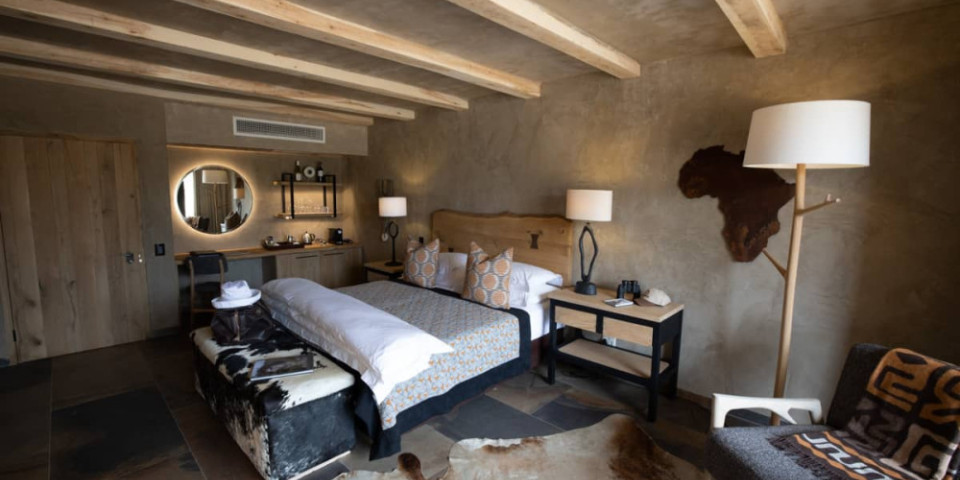Tour Length
Rates in USD $ – Change Currency
Per person, excl. international flightsOperator Rating
Other Tour Features
Filter by Operator
Filter by Accommodation
5-Day African Safari Tours
There’s nothing quite like the thrill of going on safari, and a 5-day African safari is one of the best there is. It takes no time at all to fall in love with Africa. And in 5 days you can see so much, from the animals great and small for which the continent is famous, to epic and iconic landscapes of incredible diversity. These landscapes are worth visiting as destinations in their own right, or as a backdrop to some of the greatest wildlife shows on earth. East and southern Africa have an amazing array of tours and experiences. The hardest choice is deciding which one to pick.
-
Top Rated Operator

5-Day Tanzania Safari Holidays
$1,850 to $1,865 pp (USD)
Tanzania: Private tour
Mid-range Lodge & Tented CampYou Visit: Arusha (Start), Tarangire NP, Ngorongoro Crater, Serengeti NP, Lake Manyara NP, Arusha (End)

Lion King Adventures
5.0/5 – 1,250 Reviews
-
Top Rated Operator

5-Day Botswana Luxury Tour
$4,099 to $5,599 pp (USD)
Botswana: Private tourLuxuryLodge & Tented Camp
You Visit: Kasane (Start), Chobe NP, Okavango Delta, Maun Airport (End)

Wayfairer Travel
4.8/5 – 183 Reviews
-
Best Seller

5-Day Private Experience Tanzania Safari
$2,000 pp (USD)
Tanzania: Private tour
Mid-range Lodge & Tented CampYou Visit: Arusha (Start), Tarangire NP, Serengeti NP, Ngorongoro Crater, Arusha (End)

Go Serengeti African Tours
4.9/5 – 293 Reviews
-
Top Rated Operator
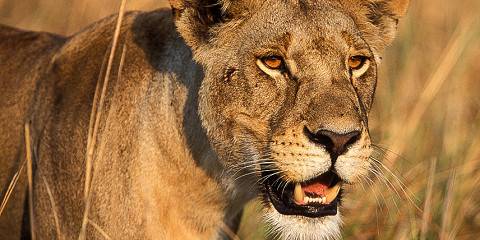
5-Day Comfort Safari Experience
$1,689 to $1,815 pp (USD)
Tanzania: Private tour
Mid-range Lodge & Tented CampYou Visit: Arusha (Start), Tarangire NP, Ngorongoro Crater, Serengeti NP, Lake Manyara NP, Arusha (End)

African Big Cats Safaris
5.0/5 – 483 Reviews
-
Top Rated Operator
![5-Day Mid Range Group Tour]()
5-Day Mid Range Group Tour
$1,595 pp (USD)
Tanzania: Shared tour (max 6 people per vehicle)
Mid-range Lodge & Tented Bush CampYou Visit: Arusha (Start), Tarangire NP, Lake Manyara NP, Central Serengeti NP, Ngorongoro Highlands, Ngorongoro Crater, Arusha (End)

Suricata Safaris
5.0/5 – 2,773 Reviews
-
Top Rated Operator
![5-Day Living Among Lions - High-End]()
5-Day Living Among Lions - High-End
$3,260 to $4,470 pp (USD)
Tanzania: Private tourLuxury+Lodge & Tented Camp
You Visit: Arusha (Start), Lake Manyara NP, Serengeti NP, Ngorongoro Crater, Arusha (End)

Soul of Tanzania
5.0/5 – 502 Reviews
-
![5-Day Tarangire, Serengeti & Ngorongoro Lodge Tour]()
5-Day Tarangire, Serengeti & Ngorongoro Lodge Tour
$2,000 pp (USD)
Tanzania: Private tour
Mid-range Lodge & Tented CampYou Visit: Arusha (Start), Tarangire NP, Serengeti NP, Ngorongoro Crater, Lake Manyara NP, Arusha (End)

Josh Dreamland Safari
5.0/5 – 46 Reviews
-
![5-Day Luxury Serengeti Fly-in]()
5-Day Luxury Serengeti Fly-in
$2,915 pp (USD)
Tanzania: Private tourLuxuryLodge & Tented Camp
You Visit: Zanzibar (Start), Serengeti NP, Ngorongoro Crater, Lake Manyara NP, Tarangire NP, Arusha (End)

Shengena Adventure
4.6/5 – 68 Reviews
-
Top Rated Operator
![5-Day Classic Drive Safari Cats, Calves & Crater]()
5-Day Classic Drive Safari Cats, Calves & Crater
$1,847 pp (USD)
Tanzania: Private tour
Mid-range Lodge & Tented CampYou Visit: Arusha (Start), Tarangire NP, Ndutu (Southern Serengeti NP), Ngorongoro Crater, Arusha (End)

Paradise & Wilderness
4.8/5 – 224 Reviews
-
Top Rated Operator
![5-Day Great Migration at the Mara River Crossing]()
5-Day Great Migration at the Mara River Crossing
$2,202 to $2,363 pp (USD)
Tanzania: Private tour
Mid-range Lodge & Tented CampYou Visit: Arusha (Start), Tarangire NP, Central Serengeti NP, Northern Serengeti NP, Ngorongoro Crater, Arusha (End)

Serengeti Smile
5.0/5 – 579 Reviews
-
![5-Day Kenya Budget Tour Masai Mara-Nakuru- Hells Gate]()
5-Day Kenya Budget Tour Masai Mara-Nakuru- Hells Gate
$640 to $825 pp (USD)
Kenya: Shared tour (max 7 people per vehicle)BudgetTented Camp & Hotel
You Visit: Nairobi (Start), Masai Mara NR, Lake Nakuru NP, Hell’s Gate NP, Nairobi (End)

Bienvenido Kenya Tours and Safaris
4.7/5 – 122 Reviews
-
Best Seller
![5-Day Fly in Serengeti, Ngorongoro Crater & Lake Manyara]()
5-Day Fly in Serengeti, Ngorongoro Crater & Lake Manyara
$3,135 pp (USD)
Tanzania: Private tourLuxuryLodge & Tented Camp
You Visit: Zanzibar (Start), Serengeti NP, Ngorongoro Crater, Lake Manyara NP, Zanzibar (End)

Safari Soles
5.0/5 – 339 Reviews
-
![5-Day Uganda Gorilla and Chimpanzees Safari]()
5-Day Uganda Gorilla and Chimpanzees Safari
$1,815 pp (USD)
Uganda: Private tour
Mid-range Lodge & HotelYou Visit: Entebbe (Start), Kibale NP (Chimps), Bigodi Wetland (Kibale NP), Bwindi Impenetrable NP (Gorillas), Lake Bunyonyi, Kampala (City), Entebbe (End)

Dav Safaris
4.9/5 – 112 Reviews
-
![5-Day Chimpanzee Trekking and Lake Kivu Experiences]()
5-Day Chimpanzee Trekking and Lake Kivu Experiences
$1,933 pp (USD)
Rwanda: Private tour
Mid-range HotelYou Visit: Kigali (Start), Nyungwe NP (Chimps), Lake Kivu, Kigali Airport (End)

Hermosa Life Tours and Travel
5.0/5 – 168 Reviews
-
![5-Day Top-Notch Wildlife Safari Expedition]()
5-Day Top-Notch Wildlife Safari Expedition
$2,250 pp (USD)
Tanzania: Private tourLuxuryLodge & Tented Camp
You Visit: Arusha (Start), Tarangire NP, Serengeti NP, Ngorongoro Crater, Lake Manyara NP, Arusha (End)

Quagga Topy Safaris and Tours
5.0/5 – 161 Reviews
-
Top Rated Operator

5-Day Kapama River Lodge Deluxe Suite Safari
$2,849 to $3,538 pp (USD)
South Africa: Shared tour (max 9 people per vehicle)Luxury+Lodge
You Visit: Johannesburg (Start), Kapama GR (Greater Kruger), Kruger NP, Johannesburg (End)

The Kruger Safari Co.
5.0/5 – 207 Reviews
-

5-Day Ultimate Kruger Park Safari Inside the Reserve
$1,899 pp (USD)
South Africa: Private tour
Mid-range You Visit: Johannesburg (Start), Kruger NP, Johannesburg (End)

Endless Summer Tours
5.0/5 – 71 Reviews
-
![5-Day Midrange Safari plus Kili Excursion from Zanzibar]()
5-Day Midrange Safari plus Kili Excursion from Zanzibar
$2,317 pp (USD)
Tanzania: Private tour
Mid-range Lodge & Tented CampYou Visit: Zanzibar (Start), Tarangire NP, Serengeti NP, Ngorongoro Crater, Materuni Waterfalls (Highlight), Zanzibar (End)

Goldfinch Adventures
5.0/5 – 49 Reviews
-
Top Rated Operator

5-Day Kapama River Lodge Safari
$2,474 to $2,810 pp (USD)
South Africa: Shared tour (max 10 people per vehicle)Luxury+Lodge
You Visit: Johannesburg (Start), Kruger NP, Johannesburg (End)

MoAfrika Tours
4.9/5 – 2,217 Reviews
-
![5-Day Uganda Gorilla, Wildlife Safari and Chimpanzee]()
5-Day Uganda Gorilla, Wildlife Safari and Chimpanzee
$2,041 pp (USD)
Uganda: Private tourBudgetLodge & Resort
You Visit: Entebbe (Start), Queen Elizabeth NP, Bwindi Impenetrable NP (Gorillas), Lake Bunyonyi, Entebbe Airport (End)

Africa Adventure Vacations
5.0/5 – 96 Reviews
7 Questions About 5-Day African Safaris

Answered by
Anthony Ham
Anthony has been traveling, and writing about, Africa for more than two decades. He writes for the ‘New York Times’, ‘Smithsonian Magazine’, Lonely Planet and SafariBookings. He is the author of ‘The Last Lions of Africa’.› More about Anthony
7 Questions About 5-Day African Safaris
 Anthony Ham
Anthony Ham
Is 5 days enough time for an African trip?
“Five days or five years: it will never be enough, but it’s a wonderful way to start. In 5 days, you’ll have at least 3 full days, and probably more, to explore some extraordinary landscapes and go looking for wildlife. That’s a whole lot of opportunities for you to see an elephant, a lion, a Pel’s fishing-owl, or whatever it is that you’re traveling so far to see. Five days is enough to get more than just a taste for the safari experience, and on the right tour you’ll pack enough memories into those 5 days to last a lifetime. To make this happen and to make the most of your time requires careful planning. As a starting point, make a list of what you really want to see on safari and prepare a list of questions to ask any prospective tour operator.”
1Where should I go on a 5-day African safari?
“There is no single answer to this question. In fact, there are seemingly endless answers, because that’s how many possibilities there are. Part of how you answer this question will depend on when you wish to travel and what you most want to see on safari. With just 5 days at your disposal, you’ll probably want to focus on one particular safari destination and get to know it well. Maximizing your time in this way may mean that it’s best to choose one of Africa’s elite parks or wildlife destinations, because that may increase your chances of seeing as many different animals as possible in a short, concentrated space of time. Possibilities among many include the Serengeti National Park (Tanzania), Masai Mara National Reserve (Kenya), Okavango Delta (Botswana), Kruger National Park (South Africa) or Etosha National Park (Namibia). Each of these places would be a wonderful place to spend 5 days. You could also combine any of these with a nearby attraction to broaden your experience a little. An example of this could be a 5-day African safari that combines the Serengeti with the Ngorongoro Crater, or the Masai Mara with Amboseli National Park.”
2What are the options to extend an African tour?
“It’s a common feeling: your safari is nearly over and you don’t want it to end. As long as you’re able to change flights and have flexibility in your other travel arrangements, it shouldn’t be a problem in theory to extend your safari. This will, of course, vary from one tour operator to the next. There are a couple of other things to remember, things that may mean you’re better off planning to stay longer in the first place, rather than trying to extend when you’re already in Africa. In high season and in popular areas, many safari operators and campsites, lodges and tented camps are booked out for months in advance. With that in mind, trying to extend your trip may come with the consequence that your choice of where to stay may be severely limited. Also in high season, vehicles (for self-drive safaris) and guides (on group or private safaris) are often booked out back-to-back. This means that you may not necessarily be able to keep the same vehicle or guide for the additional days. Sometimes these issues won’t arise, but it’s worth remembering that they can. And whatever your plans, it’s always important to read all terms and conditions carefully when booking your safari, so that you’re fully aware of any costs or penalties in the event that you decide to extend your trip.”
3What is the best time of the year for an African trip?
“There is no bad time to visit Africa on safari, but the time of year is still an important consideration in choosing when to travel. The weather is the most obvious variable that can affect your safari experience. Visiting Africa during the Dry season (which runs roughly from May or June to September or October in most of East and southern Africa) is the most popular choice. At such times, most trails and roads are open and in good condition for driving, and animals are generally easier to find because they tend to stay close to wherever there is water. It’s also the busiest time in many safari destinations, many accommodation choices are booked out months in advance, and prices are at their peak. Traveling during the Wet season (most often November to April or May, depending on the area) can be risky, although short storms are often more likely than constant rain. An afternoon storm for an hour is unlikely to disrupt your safari too much. After heavy rains, some unpaved tracks become muddy and impassable. Also, with plenty of water around, many animals disperse across a wide area, which can make them more difficult to find. But the rainy season does have its advantages: prices are lower, crowds are fewer and it’s often the best time for birding. The latter is true because many bird species migrate to Africa in November, and don’t return to Europe and elsewhere until April.”
4Which animals am I likely to see?
“What you see all depends on where and when you go. For many visitors, the Big Five (lion, leopard, elephant, rhino and buffalo) will be high on their list and it’s easy to find out which parks, reserves and wildlife areas have the Big Five in residence. Other sought-after species include cheetah, African wild dog, giraffe, zebra and more. When it comes to birds, Africa has hundreds of different species and, again, particular species inhabit specific areas, and it pays to do your research before choosing where to go if there are special birds you wish to see. In this, habitat is everything with, for example, an entirely different cast of creatures inhabiting forests (which are great for primates and forest bird species) to those you’ll find in deserts. The savannahs and light woodlands typical of so many East and southern African safari destinations tend to have the greatest diversity of species. Contrary to the dashed hopes of one disappointed safari traveler I once met, there are no wild tigers in Africa…”
5How much does a 5-day African safari cost?
“It is impossible to give a specific answer to this question because there are so many variables that will impact the cost of your safari. These considerations include when and where you travel, what accommodation (from camping to luxury and everything in between) you choose, whether you’re on a self-drive, group or private safari, and so on. With so many different elements at play, it’s worth keeping in mind that what follows is the broadest possible guide. If you plan on budget camping, and don’t mind helping out with setting up camp, cooking and other camp duties, then prices per person per day start at US$100 to US$150. If instead you plan to stay in luxury accommodation and travel on an exclusive private safari, you’ll pay at least US$500 per person per day, and possibly significantly more. Most safari prices will fall somewhere in between.”
6Should I choose a fly-in or road trip?
“There are advantages and disadvantages to both options. A fly-in safari certainly makes sense when you only have 5 days on safari. You’ll arrive in the quickest possible time, which allows you to dedicate more time to be out looking for animals or enjoying your accommodation. In fact flying may save you so much time that you might even have time to visit an extra place or two during your 5 days. An air transfer of this kind can also double as a scenic flight. Whether you’re flying out over the waters and into a remote camp in the Okavango Delta or flying past Mt Kilimanjaro into a camp in northern Tanzania or southern Kenya, the views can be incredible. The flipside of all of this is that flying in can be expensive, adding considerably to the overall cost of your safari. Apart from being cheaper and taking longer, traveling by road means being able to see and experience more of the country up close, rather than from high altitude. You’re far more likely to meet the locals if you travel by road.”
7
